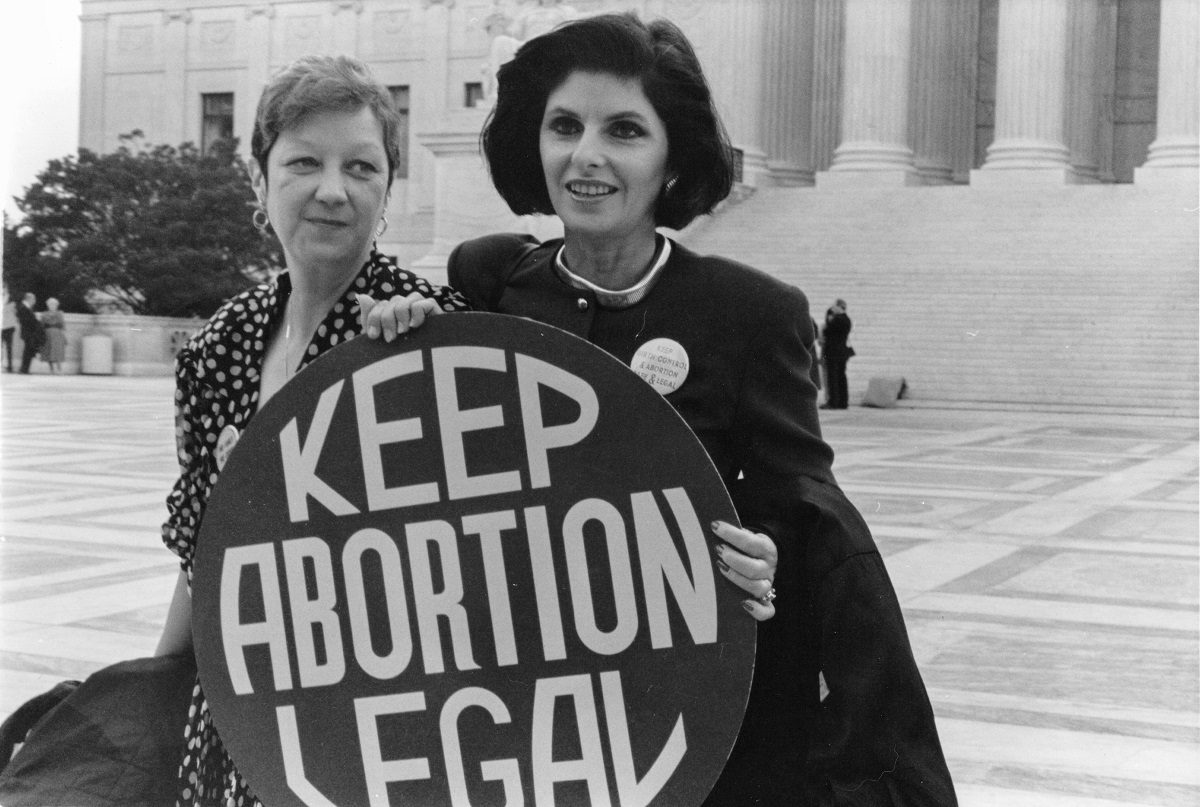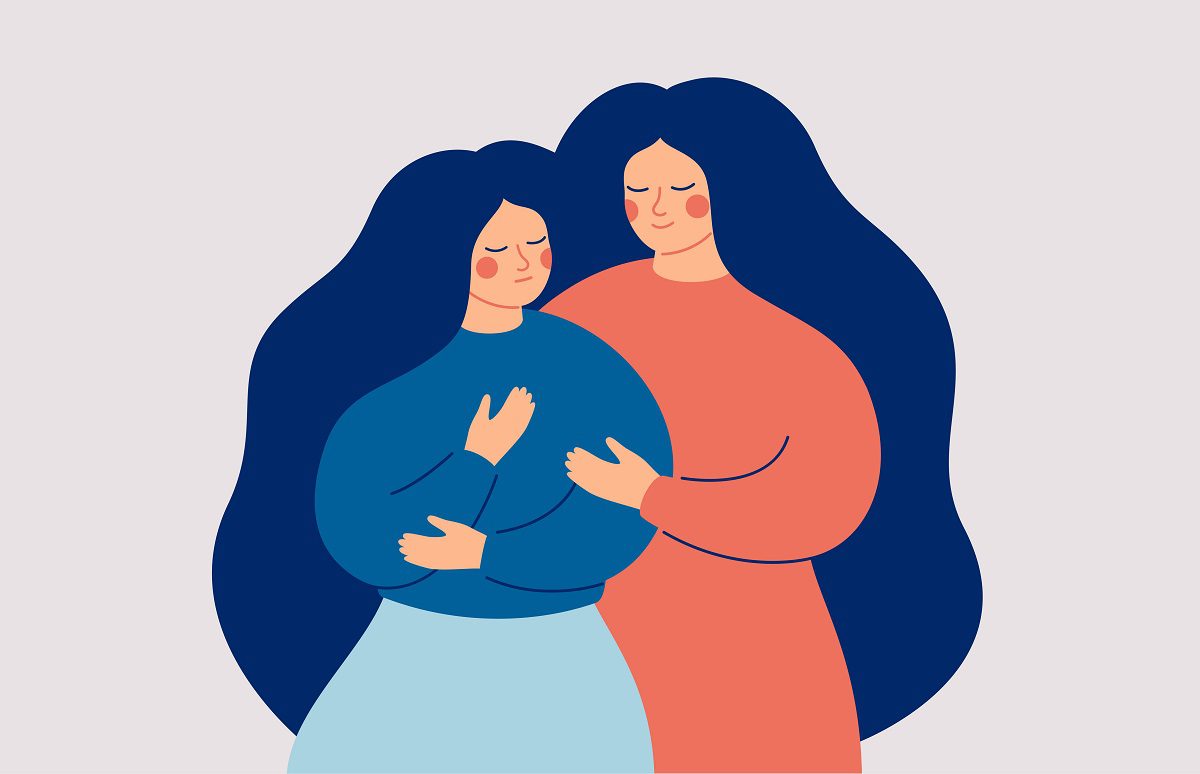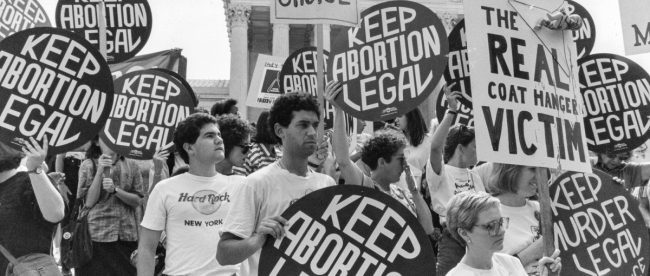Roe v Wade ripples across the pond
|
Listen to this article
Getting your Trinity Audio player ready...
|
The decision to overturn Roe v Wade has sparked protests across the US, but what does it mean for the UK?
It is easy to look at the angry scenes from the US following the Supreme Court’s decision to overturn Roe v Wade and distance ourselves from it here in the UK. But a closer look at the protests across the US reveals that people who marched for abortion rights in the 1960s and 70s are back on the streets in 2022. Fighting the fight all over again.
Their contemporaries in the UK are those who fought for abortion rights before the Abortion Act 1967 was passed. Also those who risked their lives – or lost their lives – to illegal abortion. And those who struggled to access safe abortion even after it was decriminalised.

Norma McCorvey (Jane Roe) and her lawyer Gloria Allred on the steps of the Supreme Court 1989, Photo: Laurie Shaull
Chris’ story
Chris, 69, had two abortions in the 1970s and says she is now “afraid for the women of America”.
Aged 17, she was in a relationship when she found out she had a rubber allergy and relied on the withdrawal method for contraception. Abortions were available on the NHS at the time, but she ended up borrowing £100 to pay for the procedure.
“My GP said if I had the abortion on the NHS, I would have to wait a while and then it would be too late,” she recalls. “But he knew a private gynaecologist who could do it. I’ve often wondered if it was a money-making scheme for the two of them.”
Chris had her second abortion aged 19 after what she described as “a drunken night with man that wasn’t going anywhere.” The procedure was free this time, through the BPAS. If she had not been able to access abortion, she says her life today would “not be recognisable”. Chris was training as a nurse at the time and became a midwife, which she says would not have happened if she carried the pregnancies to term, before getting married and having two children.
“We should just have the right to choose, there should be no stigma, no fear and much more awareness of how to access care, our body is ours to do with as we wish,” she says.
The Roe v Wade effect in the UK
Rather than dismissing the fallout from the Roe v Wade decision as merely an issue for America, it has multiple impacts on the UK. Here, the anti-abortion movement is vocal, albeit not nearly as large in number or influence as the US movement, but the decision has emboldened campaigners and politicians on this side of the Atlantic.
UK anti-abortion groups were quick to issue statements in support of Roe v Wade being overturned. The issue was discussed in the House of Commons, with Conservative MP Danny Kruger causing controversy over his remarks about women’s bodily autonomy. Deputy Prime Minister Dominic Raab rejected calls to include the right to choose in the government’s planned Bill of Rights, after he was asked about this by Labour MP Rosie Duffield this week. Prochoice campaigners have renewed calls for buffer zones to be placed around UK abortion clinics in response to fears that the Roe v Wade decision will increase the number of anti-abortion protesters outside these facilities.
Limits on abortion access in Northern Ireland and Scotland
The US Supreme Court decision has shone a light on the limitations to abortion access within the UK. In Northern Ireland, the law changed in 2019 to allow abortion up to 12 weeks, and beyond that time limit in circumstances, such as severe feotal abnormality. But in reality, women in Northern Ireland are still having to travel to England, Scotland, or Wales for abortions because no abortion services have been commissioned by Stormont.
However, change may be coming in Northern Ireland. Last month, MPs in the House of Commons voted to allow the UK government to directly commission abortion services in Northern Ireland, with 215 votes in favour and 70 against. Click here to find out how your MP voted.
Alliance for Choice, a Northern Ireland abortion rights campaign group, wrote an open letter to America in response to Roe v Wade being overturned. The letter compares the experiences of people in Northern Ireland and the US states where severe abortion restrictions are coming into force: “Although the vast majority of both Americans and Northern Irish people think that abortion should be legal, those intent on denying women and pregnant people access to abortion healthcare may inform the police of what they think is ‘illegal behaviour’.”
Campaigners at Alliance for Choice reiterated their commitment to help women in Northern Ireland and worldwide access safe abortion services, through strong ties with online abortion pill providers, such as Women on Web and Women Help Women.
“We have been the people offering advice and help to women and pregnant people who need abortions; finding ways to share the information that helps the most people without getting ourselves into trouble,” the letter says. “We know what it is like to be criminalised for helping people, having our homes searched and our workplaces raided, risking arrest.”
Meanwhile, in Scotland, the Abortion Act 1967 is in force, but there are no health authorities with the capacity to perform abortions up to the legal limit of 24 weeks. In most areas, 16 weeks is the cut-off. Jane Carnall from Edinburgh Abortion Rights clarified that the overwhelming majority of women who need abortions in Scotland can access care. She told Silver that around one patient a week travels to England for an abortion, either because a late-term abortion is needed or because they are combining the trip with other reasons to visit south of the border.
“Safe, legal and local” should be the mantra for abortion access, according to Jane. In Scotland, pro-choice campaigners are now turning their sights on ensuring laws to introduce buffer zones around clinics are passed in the Scottish parliament. Jane says this will prevent anti-choice protesters from harassing patients and clinic staff. There are also strong calls to ensure a senior consultant who can safely perform late-term abortions is based in Scotland for the relatively small number of cases each year. Advances in telemedicine, including home delivery of abortion pills and telephone consultations, have improved abortion access in Scotland, particularly in remote areas.

Abortion access for women over 40
For women aged over 40, access to abortion is an important part of healthcare. Despite perimenopause or menopause either on the horizon or a reality, unplanned pregnancies continue to be an issue for this age group. Factors such as improved reproductive technology have increased pregnancy rates among women over 40 – for many, what was once commonly referred to as a “geriatric pregnancy” is a source of great joy. But for other women, a pregnancy after 40 is genuinely distressing.
Portia’s story – pregnancy and ADHD
Portia, 44, had an abortion during the first lockdown: “I was busy with work and raising teenagers – despite having zero symptoms, I knew it would be positive. I had no idea how far gone I was, but I guesstimated anything up to 10 weeks.”
Carrying the pregnancy to term “didn’t even feel like a decision”, Portia recalls. Her husband was sanguine and supportive of any decision she made. “For space, for finances, our ages, and the future, it simply never felt like a practical option for us,” she says.
Portia had an initial consultation on 5 March 2020 and she was able to get a local appointment for the termination on 28 March, five days after the UK had gone into lockdown. To her relief, abortion services had not been affected, although the risk of testing positive before her appointment was a source of anxiety because “time was of the essence” – when the pregnancy was dated, she was more than 18 weeks pregnant.
“I have ADHD, so for me this means I am rational, but I struggle with executive function,” Portia explains. “I am not very organised and need to find time to concentrate for certain tasks, so I would take a week to get a pregnancy test, where other people would just crack on.”
Her local clinic was running a patients-only service, which suited Portia as she always planned to go alone, although she says it would have been stressful for those who would have preferred to take someone with them.
Portia describes the Roe v Wade decision as “staggering”.
“I do not understand how this is happening in 2022, there are really no words to the effect this has on women’s freedom and bodily autonomy in the modern world,” she says. “As we know, there is a risk of more pregnancy complications the older we are, and this threat to women’s health cannot be ignored.”
An American in the UK speaks out
Leslie, an American woman living in the UK, had an abortion in her early 20s: “I was not in any position to care for a child or be a mother – having children later on really solidified why choosing to terminate was the correct thing to do at the time.”
“I am originally from a US state where abortion will remain legal, but so many girls and women will be making anguished journeys hundreds or even thousands of miles from their homes [since Roe v Wade was overturned],” she says. “I was able to safely and privately recover from the procedure without fear of being found out. These girls and women may not have the same options.”
She says she is “devastated” by the decision to overturn Roe v Wade. Not long after her third child was born, Leslie, then 35, had a pregnancy scare. Her daughter was less than a year old. She says she could not have coped with three children under five and would have “certainly aborted” if the test was positive.
“Now I’m 45, my kids are 10, 12, and 19, my husband is 52 and our family is complete,” Leslie told Silver. “Though I am healthy enough to carry a pregnancy to term, I have no desire to do so. My pregnancies were rough physically – I had such bad pelvic problems during my second pregnancy that my doctors were concerned I’d end up in a wheelchair.”
Leslie enjoys the relationships she has with her children now they’re older, without being “bothered with breastfeeding, nappies, toddler groups and packing a ridiculous bag for a trip to the shops.”
“While there are women my age and older who do become pregnant and give birth, that’s their choice – I don’t want to be dealing with primary school in my 50s and teen drama in my 60s.”
She urges women in the UK to be vocal about supporting abortion rights, based on her own experience of abortion in the US: “I grew up with women who talked about the dark days before Roe v Wade and the affects it had on families and communities. UK women need to be very vocal about supporting abortion rights and make sure nothing like this can happen here. We’ve seen rights eroded in this country – don’t rest on your laurels and think it can’t happen here. Your life and safety depend on your vigilance. Don’t frame it as a choice – it’s your right to healthcare.”

In a career that has spanned Australia, the Middle East and the UK, Georgia has written about all sorts of things, including sex, cars, food, oil and gas, insurance, fashion, travel, workplace safety, health, religious affairs, glass and glazing… When she’s not writing words for fun and profit, she can usually be found with a glass of something French and red in her hand.



Leave a comment